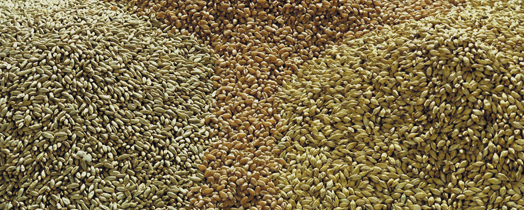04 | 2011 – Fraunhofer FEP process disinfects seeds effectively and efficiently
Scientists at the Fraunhofer Institute for Electron Beam and Plasma Technology FEP in Dresden have developed a process for effectively and efficiently freeing seeds of pathogens such as bacteria and fungi.
Pathogenic EHEC bacteria have recently caused widespread illness in Germany and Europe and this has created huge uncertainty for consumers. The latest reports point the finger at the seeds of bean shoots as possibly being the source of the EHEC bacteria contamination. Regardless of what source is eventually found, recent weeks have brought home the severe consequences of contaminated food and highlighted the importance of effective treatment of seeds and efficient sterilization of foods.
The Fraunhofer Institute for Electron Beam and Plasma Technology FEP in Dresden has for some years had a proven technology for effectively rendering pathogens such as bacteria and fungi on seeds harmless. The process utilizes low-energy electrons to kill germs. The special configuration of the equipment means that the seeds are separated and that the electrons can bombard the seeds from all sides. The electrons only act on and in the seed coat, and the ability of the seeds to germinate and the DNA of the seeds are not adversely affected. A special quality monitoring system safeguards and manages the quality of the seed treatment, ensuring the maximum effect for optimum plant tolerance.
As the treatment involves solely a physical process, the harmful organisms cannot develop resistance as can occur when antibiotics are used. In addition, there is no use of chemicals and so the environment and the health of users are not impacted.
In Germany the effectiveness of electron treatment on many types of cereal seeds and against various pathogens (including pseudomonas bacteria) has been demonstrated. Many years of collaborative work with the Julius-Kühn-Institute have confirmed that the electron treatment of seeds is suitable for different cultivation conditions. Besides the Julius-Kühn-Institute, the European and Mediterranean Plant Protection Organization (EPPO) also recommends the seed sterilization process using electrons for both conventional and organic agriculture.
A mobile system for seed treatment using electrons is already available. This has an hourly seed throughput of up to 30 metric tons. Up until now some 4000 to 5000 metric tons of seed per year have been processed in Germany using this technology and subsequently cultivated in conventional and organic agriculture. This has predominantly concerned cereal seeds (wheat, barley, oats), and also seeds from rape, leguminous plants, and vegetables. Frank-Holm Rögner, head of the Electron Beam Processes business unit at the Fraunhofer FEP, stresses: “The electron treatment of seeds is an advanced technology and is already available in Saxony. Expansion of the technology to the sterilization of foods is certainly feasible from a technological point of view.”
The treatment of foods with accelerated electrons is currently not permitted in Germany. An ongoing study by the EU has, however, shown that accelerated electrons have no adverse effects on the properties of foods compared to foods sterilized using conventional methods.
More information can be found under: www.fep.fraunhofer.de
 Fraunhofer Institute for Electron Beam
Fraunhofer Institute for Electron Beam